What is it that can compel people to traverse miles upon miles, coming from all directions, to gather for a communal celebration? Nothing other than love. Only love, as a response to the love emanating from a fatherly heart. Thus, it’s not at all surprising that today the Bigorski Monastery is filled to the brim with joyful, smiling faces, who came to partake in the joy of its Elder, the Right Reverend Bishop of Antania, Mr. Parthenius. And not just them. The love of Christ, the abundant blessing of the great Lampsakian Wonderworker Saint Parthenios, and genuine friendship and fellowship in God, brought to the monastery our dear fathers, brothers, and friends in Christ: the Bishop of Amorion and Abbot of the Holy Monastery of Vlatadon in Thessaloniki, Mr. Nikifor from the Ecumenical Patriarchate, who, bearing the blessing and well-wishes of His All-Holiness the Ecumenical Patriarch Mr. Bartholomew, traveled with theology students from various countries and church jurisdictions housed in his monastic dormitory, as well as with Hierodeacon Parthenios from Tanzania, a cleric of the Alexandrian Patriarchate; Archimandrite Mr. Kalinik, who with monk Nektarios came from the illustrious Imvros as representatives of Metropolitan of Imvros and Tenedos Mr. Cyril; Archimandrites Mr. Matthew and Mr. Cherubim from the Orthodox Church of Greece – our long-standing brothers and friends, along with the Athonite deacon Fr. Chrisostomos and several Athonite fathers. And all of them arrived at the sacred house of the Honorable Forerunner, bringing the gift of their love and respect, together with the reverend presbyters from Kichevo, Ohrid, Radovish, and numerous faithful. Yes, our Holy Monastery rejoiced last night, seeing the unity in love that is only possible and true in Christ.
The festive evening service displayed the splendor of the Bigorski temple in full radiance. It shone just as the faces of those present within it. The tender singing of the angel-voiced choir composed of Athonite fathers and Fr. Cherubim, complemented by the worthy response of the Bigorski psalters, made the temple a heaven, where the blessing of Saint Parthenios of Lampsacus, who was immensely joyful at this sacred gathering in his honor, abundantly flowed.
This beautiful assembly was, in fact, the most wonderful gift for our Elder, who deeply moved, publicly confessed his immense gratitude, translating it into an inspired and timely word:
![]()
Your Grace, our beloved brother and co-celebrant, holy Bishop of Amorion and Abbot of the Holy Imperial, Patriarchal, and Stavropegic Monastery of Vlatadon in Thessaloniki, Mr. Nikiforos,
Venerable, most venerable, and reverend fathers,
Right reverend presbyters,
Venerable mother superiors and reverend sister nuns,
Dear students of the Monastery of Vlatadon,
Beloved guests and cherished brothers, sisters, and children,
Contemplating this sacred ecclesiastical assembly, composed of members from several Local Orthodox Churches, in honour of Saint Parthenius of Lampsacus, the Wonderworker, who is the heavenly protector of my humility, I see myself and all of us enveloped in the great embrace of the Orthodox faith and God’s revelation that connects us with the universal Church, as the body of Christ. This is what our common, irreplaceable, and unique identity is recognized by – that we are all Christ’s, and everything else fades before this belonging. Therefore, I believe that this celebration is not just a personal joy and individual commemoration, but also a deep reflection of the conciliarity of the Church, a testimony to our shared identity in Christ, Who invites us to love, to that “bond of perfection” in communion with Him and one another.[1] /p>
And precisely for this reason, I find myself lacking suitable words to adequately thank all of you for this “unspeakable and glorious joy” [2] that you bring not only to me but to the entire Orthodox community here.
I especially thank you, Holy Bishop of Amorion and through you His All-Holiness the Ecumenical Patriarch Mr. Bartholomew, who these days has already sent me a congratulation letter with best wishes and congratulations from his sensitive paternal heart, and now has confirmed it again through your esteemed personal presence. I thank you, Right Reverend Bishop, for all the prayers and efforts you contributed to our ancient and glorious Ohrid Archbishopric Justiniana Prima, to find once again unity and conciliarity in the Orthodox ecumene. Before you, we express our immense gratitude to all who selflessly invested themselves and sacrificed for the establishment of unity. We will always keep alive our memory, gratitude and appreciation for the First Throne of Orthodoxy, the Great Church of Christ, and to its holy Primate, the Ecumenical Patriarch Mr. Bartholomew, who with his higher judgment, founded in the canons and tradition, honoured the humble appeal from our Holy Synod, and was the first, being the sole authority, to justify and receive us into the embrace of the holy Orthodoxy, making us “a royal priesthood, a holy nation”.[3].

Indeed, we Orthodox must never forget the city of Constantinople, the city of our Most Holy Lady Theotokos, the city of countless Saints, where the redemptive faith was affirmed and from which Orthodoxy shone forth towards many nations and regions. That Divine Providence arranged this centre of universal Orthodoxy and that God’s grace maintains and cares for it, is confirmed by the very fact that to this day, the Mother Church, the Ecumenical Patriarchate lives there. Faced with attempts for demeaning it and taking away its glorious seats, first and foremost the magnificent Hagia Sophia, it was finally, not without God’s knowledge and providence, moved to the district known as Phanar, from where it humbly continues to shine its light to all in spirit and truth. The Mother of God has not forgotten her imperial city; the Saints have not forgotten the city of the Ecumenical Councils, but even today protect their heritage in it and call us, their children, all Orthodox, to unite around the first Throne of the faith and civilization of ours. To honour and support it, thereby gaining the blessing from the heavenly city of Saints. Unity in the faith of the Gospel and in the tradition of the Fathers is one of the aspects of conciliarity, I would say – its quality, but also a condition. Only he who gathers, who strives to bring the estranged and separated back into Christ’s flock, only he who heals wounds according to the remedies prescribed by the Fathers of the Church – he is the one who builds, renews, and unites. He performs the works of light, which simultaneously reveal the works of darkness, standing opposite. Today, trying with my modest abilities to discern the events in the world and in the Church, I wonder – has the nature of the Christian changed, losing Christ? Have we lost empathy, the need for the common collective and the individual need of every brother when in suffering? Do we use the opportunity, when someone is burdened by the yoke of temptation, to fulfil some of our desires and ideas, which are passionate, power-loving, and vanity-like? However, Lord never allow us to be without hope, but calls us to endure to the end, for ours is to “stand firm, to stand with fear, to be attentive,” and He supplements weaknesses and establishes justice.

And indeed, is not Constantinople the cornerstone of our Orthodox civilization? Is it not the cradle in which Romiosini was born and grew, that nationally incomprehensible entity, not only as a historical phenomenon, but also as a living and eternally active existence of the indestructible spirit of Orthodoxy, intertwined with human reach into the sublime and beautiful? The saga of Romiosini is not confined to the annals of history; it is a vivid, pulsating presence that echoes in the heart of every Orthodox, regardless of his current national affiliation. It embodies the synthesis of the Christian faith and the wisdom and experience of the centuries. This enduring legacy, forged in the fire of trials, challenges, and triumphs, serves as a beacon, guiding the Orthodox person through the vicissitudes of history. The essence of Romiosini transcends geographical and temporal boundaries, personifying the eternal quest for truth, beauty, and virtue. The legacy of Romiosini also stands as a monument testifying the capacity of the human spirit to endure, adapt, and thrive amidst the shifting sands of time. The wealth of this heritage, contained in Liturgy, art, philosophy, aesthetics, and communion, offers a source of wisdom and inspiration for navigating through the complexities of the modern world. It is a heritage, which calls all Orthodox to live in accordance with the values of faith, hope, and love. Thus, fostering a sense of unity and purpose that transcends individual and collective challenges, while simultaneously preserving the authenticity and distinctiveness of everyone equally and incorporating differences into a common wealth of culture and beauty. Hence, it is imperative to recognize that the true strength of the New Rome lies not in the realm of temporal power or worldly recognition but in the depth of its spiritual and cultural heritage, in holiness and blessing, and most of all, in the Cross and Resurrection testimony. For what is the highest reach in the spiritual biography, if not the humble-like suffering that surpasses all human logic and overcomes forces? It is then we truly realize how much God loves us, but at the same time how much we, persevering in the struggle, can show to Him that our heart is His throne. I will conclude this contemplation with the exclamation of today’s father of Romiosini, the Ecumenical Patriarch Mr. Bartholomew: “And you, most beloved Romiosini, carry firmly the omophorion of the Most Holy Theotokos and follow her steps to the Praetorium, to martyrdom, to the Cross, to the taking down from the Cross, and to the Tomb. So that before the new day even dawns, we could hear together with her: ‘Pure Virgin, rejoice! Thy Son hath risen from the grave on the third day,’ and you, and you, our sweet Romiosini together with Him, together with the Risen Christ!”
Considering these humble reflections, Holy Bishop of Amorion, and wishing to thank you once more for your desire to come here with the students from Your Holy Monastery, who hail from several countries across different continents, I cannot say that you come as strangers from afar, but rather as our own, coming from our common cultural homeland, from the spiritual realm of the Holy Fathers of our faith. Your testimony that you come to this Holy Monastery of the Honourable Forerunner as to your own home, and the honour and love you show us, affirm what was previously said and gladden and soothe our hearts.
I especially thank the Athonite fathers, who, besides the effort made to travel here, with their singing, soaked in prayerfulness, spirituality, and asceticism, revealed to us a world where time and eternity intertwine. Their heavenly chanting is not only an expression of serious monastic devotion but also a deep inhalation of Romiosini, an introduction to the essence of Orthodox tradition and celebration.
I thank our beloved Venerable Fathers, Mr. Matthew and Mr. Cherubim, our years-long brothers and friends, as well as the other honourable fathers from the Orthodox Church of Greece, Venerable Father Kalinik, who came to us from Imbros, Turkey, and all of you, beloved children, brothers and sisters, who with your prayers and joy, brought heaven in this sacred space.
We joyfully anticipate the arrival tomorrow of our esteemed and holy Archpastor of this god-fearing Diocese of Debar and Kichevo, His Eminence Metropolitan Mr. Timothy.
May the prayers and blessings of our Father among the Saints, Parthenius of Lampsacus the Wonderworker, be with all of you!
[1] Col. 3,14.
[2] 1. Pet. 1,8.
[3] 1. Pet. 2,9.
Beloved spiritual children took the opportunity to present the Elder with several appropriate gifts, in memory of their endless gratitude for his constant paternal sacrifice and prayers. The monastic community gifted him an episcopal staff, to remind him, according to the words of Archimandrite Dositheos, who addressed him on behalf of the brotherhood and sisterhood, of his pastoral responsibility to sacrificially save his troubled children:
![]()
Holy Bishop, bless!
Esteemed our Elder, father, and Abbot of this Holy Bigorski Monastery, Bishop of Antania, Mr. Parthenius,
Respected Holy Bishop of Amorion, Mr. Nikiphoros,
Esteemed Archimandrites, brothers and sisters in Christ, present and justifiably absent, yet present in spirit,
Today, once again, as every year on this day, we are gathered by the grace of the Holy Spirit, as well as the ever-present through his holy relics Saint Parthenios, Bishop of Lampsacus, on the name day of our spiritual Father.
This name day, by Providence and God’s permission, always finds us in different states: whether sorrow for something lost, joy from an unexpected God’s gift or a dear guest, but always brings great consolation and increases grace, making our sorrow smaller and knowing it is transient and God, through the prayers of the Elder, will compensate. And we know that what is lost is not lost or was never ours, and the joy is all the greater because it is shared with the neighbor, with our brothers and sisters.

By God’s providence, the first monks and monastic communities appeared, wonderfully arranged to have one Elder, a Shepherd of rational sheep, who voluntarily flock to that community and after a period of trial, they lay crucified on the cross and with bowed head offer the scissors to Christ with which they receive the tonsure and give the three vows, one of which is obedience to the Elder and the brotherhood or sisterhood.
Here, I would pause, according to the Gospel reading, on the pericope about the Good Shepherd and the thief. We can immediately recognize the Good Shepherd, who sacrifices for his sheep, and the bandit or hireling leaves his sheep and flees. To that, I would add and remind, but will not elaborate further this time on those words: “Such a teacher was needed for us.”
One of the characteristics of the Shepherd is his staff or crook, depending on the situation and nomenclature. With it, he can, according to his own judgment, pull a lost sheep by the leg and thus save it from the wolf’s jaws, but of course, this depends on the sheep, which, as we said, is rational and has free will given by God and although having made a vow, can by that same free will go into the wolf’s jaws.
The Shepherd, out of his love, will shed blood, all in order to not lose a single sheep from that flock. Another characteristic of the Shepherd is his love and gentleness, with which he can gently strike with the staff, with great maternal love, to teach that sheep which strays from the flock, and will not allow there to be black sheep or goats that at the Second Coming would be on the left side of Christ because the goal of the Shepherd and the meaning of the community is for all together to be saved and therefore we all carry and help each other in good and bad.
The Good Shepherd! Without any exaggeration, we can say, our Elder is indeed good and I have said, if we were to find fault, it would be that he is excessively good. He also has humility, about which the wicked one said to Saint Macarius the Great: “You defeated me with your humility.” Only there and with that humility, no one can defeat us, for which our Savior, the Good Shepherd, the Lord Jesus Christ, set an example when with such great humility endured suffering and was crucified on the Cross and died as a man on the cross, but then Rose on the Third Day!
With that humility and great love, our Elder carries and bears all of us, first us monks who are daily before him and offend him most often, and then all spiritual children, as well as all those who only come for advice, meetings, and other spiritual talks.
Following the example of our Savior, our Elder is ready to carry the rational sheep on his shoulders when it no longer has the strength or has fallen, but again I will repeat, if it agrees with its free will, and as theologians say, that is the only thing God cannot do – to take away the once given free will of man. Again a digression, and to this day in Turkish, Adam is called a human!

In the context of what was said, on behalf of the brotherhood and sisterhood. Our holy Elder, accept this staff.
For many and blessed years and all together to be in the Kingdom of Heaven, by Your holy prayers!
After the completion of the Vespers service, in the great monastic synodikon, the Elder had the opportunity to receive a sung congratulation from the choir “Mitropolit Kozma Prechistanski” from Kichevo, who on this occasion with special love sang a hymn in his honor. A special adornment of the evening was the beautiful and melodious singing of our beloved friend Verche from Ljubojno, who in her way, together with the orchestra of the Kichevo choir, fulfilling several traditional songs, congratulated the Elder on his name day, thus welcoming our dear guests from various places around the world.
For many years, our most beloved Holy Bishop!















